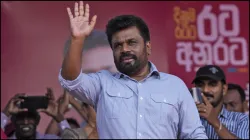Colombo: Sri Lanka's newly-appointed President Anura Kumara Dissanayake has outlined his foreign policies, saying he does not want to be "sandwiched" between India and China. Sri Lanka has sought to balance ties with neighbouring India and China, who are the leading creditors and investors jostling for geopolitical influence on the island.
The Marxist-leaning won the Sri Lankan presidential election, defeating opposition leader Sajith Premadasa in a historic second round of vote counting. Dissanayake is the leader of the Janatha Vimukhti Peremuna (JVP), which is part of the National People's Power (NPP) alliance and has traditionally championed Marxist economic policies centred on protectionism and state intervention.
Dissanayake has several challenges in deciding the future of reforms in the debt-ridden nation that is slowly emerging from a crushing financial crisis. He has already ordered the dissolution of the parliament, paving the way for fresh parliamentary elections on November 14 to push through his reform agenda.
Dissanayake's remarks on India and China
Dissanayake has expressed his intention to continue working with India, China and Japan, who are key parties to the country's $12.5 billion debt rework, in order to foster economic ties to better growth. There have been reports of concerns in New Delhi as the 55-year-old Marxist-leaning politician is believed close to China and may alter the geopolitics in the region.
In an interview with the global magazine The Monocle ahead of the presidential elections, Dissanayake said, "We won’t be a competitor in that geopolitical fight, nor will we be aligned to any party. We don’t want to be sandwiched, especially between China and India. Both countries are valued friends and, under an NPP government, we expect them to become close partners. We also want to maintain relations with the EU, the Middle East and Africa."
India and China have both extended their congratulations to Dissanayake after his election victory. "Sri Lanka holds a special place in India's Neighbourhood First Policy and Vision SAGAR. I look forward to working closely with you to further strengthen our multifaceted cooperation for the benefit of our people and the entire region," said Prime Minister Narendra Modi.
In response, Dissanayake said, "I share your commitment to strengthening the ties between our nations. Together, we can work towards enhancing cooperation for the benefit of our peoples and the entire region."
Jaishankar on India's relations with Sri Lanka
Meanwhile, External Affairs Minister S Jaishankar expressed confidence that India’s relationship with neighbours Sri Lanka and Bangladesh would continue to be “positive and constructive”. He said India stepped forward when Colombo was facing a very deep economic crisis, and “very frankly, when nobody else came forward".
"At that time we did it, it was not like we had a political conditionality which accompanied that. We were doing it as a good neighbour who did not want to see that kind of economic meltdown at our doorstep," the minister said. Jaishankar said that what happens politically in Sri Lanka, “is for their politics to work out".
"At the end of the day, each of our neighbours will have their own particular dynamics. It's not our intention to suggest that their dynamics must necessarily adhere to what we might consider as being better for us. I think this is the real world. I mean, everybody makes their choices and then countries adjust to each other and find ways of working it out,” he further said.
(with inputs from agencies)
ALSO READ | Harini Amarasuriya named as the new Prime Minister of Sri Lanka | Who is she?
Latest World News
